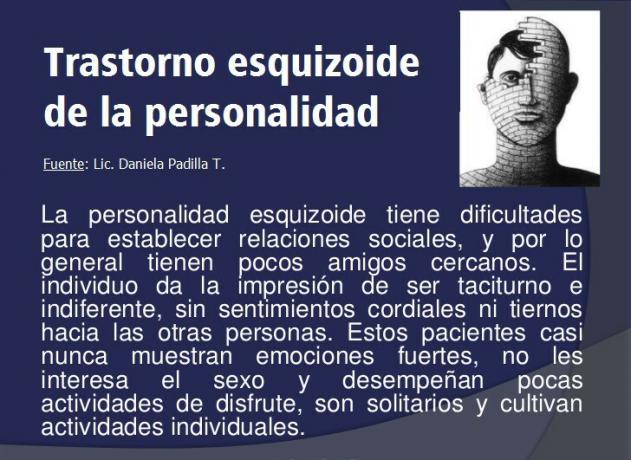Schizoid Personality Disorder: causes, symptoms and treatment
The schizoid disorder belongs to the so-called “Group A” (rare or eccentric) of personality disorders, and is a rare condition in which people avoid social activities and interaction with others individuals.
People with this pathology often seem strange or peculiar, and are often distant and indifferent to social relationships. They are characterized by preferring solitary activities and rarely express strong emotions. Although schizoid personality disorder sounds similar to the schizophrenia, we are facing two very different disorders.

What are personality disorders
Individuals with personality disorders they show long-lasting patterns of thought and behavior that differ from what society considers normal. The inflexibility of your personality can cause distress, and it can also interfere in different areas of the person's life, including social and work functioning. People with personality disorders often have poor coping skills and difficulties forming healthy relationships.
Unlike people who suffer
anxiety disorders, who know they have a problem but are unable to control it, people with disorders of personality are generally unaware of the problem they suffer and tend to think that they have no trouble. Because they don't know they have a disorder, they don't often go for help to treat it.Symptoms of Schizoid Personality Disorder
The symptomatology of Schizoid personality Disorder is usually characterized by Social isolation and the avoidance of social activities and interpersonal relationships. These people often organize their lives to avoid contact with other people. Many never marry or can continue to live with their parents into adulthood.
Others common traits of people with this disorder are:
- They do not desire or enjoy close relationships, even with family members
- Choose solitary jobs and activities
- Is not interested in having sexual experiences with other people
- They do not usually have close friends or trusted people
- Are indifferent to praise or criticism from others
- They show emotional coldness
Causes of Schizoid Personality Disorder
Little is known about the causes of Schizoid Personality Disorder, but It seems that both genetic and environmental factors play an important role in this disorder..
Environment and genetics
On the one hand, many mental health professionals speculate that the absence of affection and affection on the part of parents during childhood contributes to the development of the pathology, but the high presence of the disorder in families with a member who suffers from schizophrenia suggests that it may have a hereditary factor remarkable.
Treatment of Schizoid Personality Disorder
As has been commented, people with this disorder rarely seek help from a professional. In addition, treatment is a challenge for the psychotherapist due to the difficulty of establishing relationships on the part of the patient. This is usually solved when the therapist shows a certain distance with him.
Psychotherapy and pharmacological support
This treatment combines psychotherapy with the administration of drugs, generally antipsychotics such as Risperidone or Olanzapine. In cases where the disorder presents comorbidity with disorders such as depression or anxiety, antidepressants or anxiolytics are also usually administered.
Learning social skills
Since these individuals find it difficult to learn social patterns quickly, they need to learn specific social skillsFor example, explaining some behaviors that could be seen as rude or rude. The psychotherapist can influence so that the patient learns how he distorts her thoughts or perceptions, in addition to re-educating him so that he acquires more adaptive ways of responding and be related.
If the disorder is mild or moderate, it may improve quickly. However, in the most delicate and severe cases, the patient may have greater difficulty working and living independently. Treatment focuses on improving coping skills, as well as improving social interaction, communication, and self-esteem.
